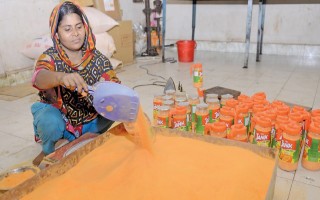Food adulteration starts at factories
Food adulteration in Bangladesh starts at factories with rampant use of non-food grade and date expired and low quality chemicals to process them.
Food engineering teachers at universities and researchers told New Age that there was no dearth of evidence that around 80 per cent of the processed foods consumed by millions of people daily were harmful to human health.
But there is serious dearth of action against these irregularities despite their dangerous consequences on public health, they said.
They said that non-food grade chemicals or date expired food-grade chemicals are used to process these foods.
Date expired food grade chemicals are nothing but poisons that could kill people instantly, said Bangladesh Agricultural University’s food technology and rural industries professor Abdul Alim.
Permissible chemicals, known as food additives, are needed to blend oil and water and perform about a dozen other food processing tasks including coloring, adding flavors and textures, to sweeten, enhance shelf life and adding glaze.
Many additives have to be used in wrapped candies and breads, milk in poly bags, biscuits in paper packets, bottled juices and ketchups, nuts in containers and ice cream in boxes.
The modern food processing industry revolutionized the use of over a thousand chemical formulations developed as food additives in the 2nd half of the 2oth century.
But Bangladesh approved over a 100 food additives.
But food regulators in Bangladesh even don’t care to know whether or not the prescribed additives are used in processing foods.
This happens as the authorities show no interest in market monitoring.
Regulatory incapacity also leads to unregulated import of chemicals, said researchers and food engineering teachers.
An ever increasing number of people are suffering from kidney and liver malfunctioning, cancers, diabetes , hypertension and other non-communicable diseases as a direct consequence of processed food consumption, they said.
Consumption of food processed with substandard or industrial grade chemicals multiplies the risk of people suffering from these dangerous diseases, said Alim.
Mobile courts in Bangladesh regularly find that textile grade chemicals had been used to add colour to foods.
In March a Rapid Action Battalion mobile court seized 45 tonnes of date expired Dicalcium Phosphate from a chemical warehouse at Armanitola in the Old Town.
Executive magistrate Sarwoer Alam, who led the drive, told New Age that he was shocked see that 75 per cent of the imported chemicals stored there had no labels to show the country of origin, date of expiry, the name of the manufacturers or the purpose of use.
The dates of most of the remaining chemicals had expired long ago, said Sarwoer.
The date of the seized consignment of dicalcium phosphate had expired in 2005, Sarwoer said, adding that there were sacks of food grade citric acid and other chemicals the dates of which had expired five to seven years ago.
Sarwoer said that he had gone to Armanitola not to detect chemicals for using in food processing but to inspect relocation of chemicals warehouses from the densely populated Old Town to Munshiganj.
‘Dangerous chemicals stored for food processing compelled me not to ignore the irregularities and impose the fine of Tk 50 lakh on an importer,’ said Sarwoer.
Dicalcium phosphate is not approved by Bangladesh Food Safety Authority as a food additive.
Colorants are frequently used food additives, in Bangladesh.
Last year a team of researchers of BUET tried to develop a mobile app to enable consumers detect harmful colors in foods.
The researchers were shocked to find out that industrial grade chemicals sold in the market were of no use in developing the mobile app.
‘We had to import food grade colours for our project,’ said the team leader and chemical engineering department’s associate professor Mohidus Samad Khan.
‘Shops selling colours said that their products were equally fit for dying fabrics and foods,’ said Mohid.
A science ministry funded study done by BAU between 2011 and 2013 found most of the juices, jams, squash, pickles and spices sold in the market harmful for public health, said Abdul Alim.
Alim said that though the processed food industry grew rapidly after 2000 the government took no initiative to put in place any monitoring mechanism to ensure safe food free from harmful chemicals.
Daffodil International University’s head of the department of nutrition and food engineering professor Bellal Hossain, who had earlier worked as a food chemist in the defense ministry for over a decade said that the use of industrial grade chemicals in food processing was very common in Bangladesh.
Bellal said that 80 per cent of the samples tested at his department’s food lab were found to be harmful for health as they contained non-food grade chemicals.
For instance, he said, industrial grade egg yellow colour was regularly used in the country on curds, juices simply out of profit motives as it cost Tk 500 per kg while the food grade colours could cost in excess of Tk 13,000 per kg.
Bangladesh Agro-Processors Association deputy secretary Shahanaz Begum Panna admitted food processors were mostly unaware about unsafe chemicals used by the food industry producing 230 major packaged foods.
She said that Bangladesh exports processed food worth $ 700 million annually, about 30 per cent of the production, to the Middle East.
‘The international processed food market is mostly off-limit to us because of food safety issues,’ she said.
Bangladesh Food Safety Authority chairman Mohammad Mahfuzul Hoque admitted that he has no idea about what chemicals are used in processing foods.
A BUET study revealed last year that chemicals used to artificially ripen fruits contain heavy metals and other toxic substances.
News Courtesy: www.newagebd.net











